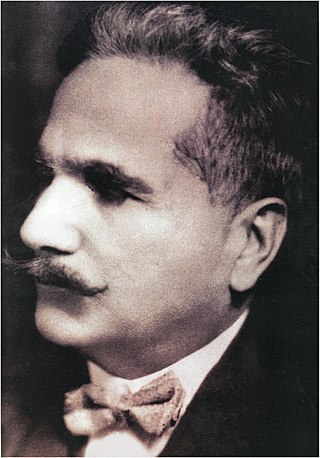Related Research Articles
Jihad is an Arabic word which literally means "striving" or "struggling", especially with a praiseworthy aim. In an Islamic context, it can refer to almost any exertion of effort to make personal and social life conform with God's guidance, such as internal struggle against one's evil inclinations, proselytizing, or efforts toward the betterment of the Muslim community (Ummah), though in non-Muslim societies the term is most often associated with armed conflict.
Sunni Islam is the largest branch of Islam, followed by 85–90% of the world's Muslims, and simultaneously the largest religious denomination in the world. Its name comes from the word Sunnah, referring to the tradition of Muhammad. The differences between Sunni and Shia Muslims arose from a disagreement over the succession to Muhammad and subsequently acquired broader political significance, as well as theological and juridical dimensions. According to Sunni traditions, Muhammad left no successor and the participants of the Saqifah event appointed Abu Bakr as the next-in-line. This contrasts with the Shia view, which holds that Muhammad appointed his son-in-law and cousin Ali ibn Abi Talib as his successor.
Islamic fundamentalism has been defined as a revivalist and reform movement of Muslims who aim to return to the founding scriptures of Islam. The term has been used interchangeably with similar terms such as Islamism, Islamic revivalism, Qutbism, Islamic extremism, Islamic activism, but also criticized as pejorative, a term used by outsiders who instead ought to be using more positive terms such as Islamic activism or Islamic revivalism.

Ummah is an Arabic word meaning "nation". It is distinguished from shaʻb, which means a nation with common ancestry or geography. Thus, it can be said to be a supra-national nation with a common history.
Liberalism and progressivism within Islam involve professed Muslims who have created a considerable body of progressive thought about Islamic understanding and practice. Their work is sometimes characterized as "progressive Islam". Some scholars, such as Omid Safi, differentiate between "Progressive Muslims" versus "Liberal advocates of Islam".

The Sabaeans or Sabeans were an ancient group of South Arabians. They spoke Sabaic, one of the Old South Arabian languages. They founded the kingdom of Sabaʾ in modern-day Yemen, which is considered to be the biblical land of Sheba and "the oldest and most important of the South Arabian kingdoms".

Pan-Islamism is a political movement which advocates the unity of Muslims under one Islamic country or state – often a caliphate – or an international organization with Islamic principles. Historically, after Ottomanism, which aimed at the unity of all Ottoman citizens, Pan-Islamism was promoted in the Ottoman Empire during the last quarter of 19th century by Sultan Abdul Hamid II for the purpose to prevent secession movements of the Muslim peoples in the empire.
Jahiliyyah is a polemical Islamic and Arabic term that refers to the period of time and state of affairs in Pre-Islamic Arabia before the advent of Islam in 609 CE. It usually refers to the Age of Ignorance. The term jahiliyyah may be derived from the verbal root jahala (جهل), "to be ignorant or stupid, to act stupidly". Alternatively, it is an abstract noun derived from jāhil, referring to barbarism.
Takfir is an Arabic and Islamic term which denotes excommunication from Islam of one Muslim by another, i.e. accusing another Muslim to be an apostate. The word is found neither in the Quran nor in the ḥadīth literature; instead, kufr ("unbelief") and kāfir ("unbeliever") and other terms employing the same triliteral root k-f-r appear.
In Islam, khums refers to the required religious obligation of any Muslims to pay 20% of their acquired wealth from certain sources toward specified causes. It is treated differently in Shia and Sunni Islam. This tax is paid to the imam, caliph or sultan, representing the state of Islam, for distribution between the orphans, the needy, the [stranded] traveler, and the descendants of Islamic prophet Muhammad. In some jurisdictions, khums is paid on minerals extracted in regions under the control of the state. Khums separate from other Islamic taxes such as zakat and jizya.

Islamic music may refer to religious music, as performed in Islamic public services or private devotions, or more generally to musical traditions of the Muslim world. The heartland of Islam is the Middle East, North Africa, the Horn of Africa, Balkans, and West Africa, Iran, Central Asia, and South Asia. Due to Islam being a multi-ethnic religion, the musical expression of its adherents is vastly diverse. Indigenous traditions of various part have influenced the musical styles popular among Muslims today. The word "music" in Arabic, the language of Islam, is defined more narrowly than in English or some other languages, and "its concept" was at least originally "reserved for secular art music; separate names and concepts belonged to folk songs and to religious chants".

Al-Ḥijr is the 15th sūrah. It has 99 āyāt (verses).

ʿĀd was an ancient tribe in pre-Islamic Arabia mentioned frequently in the Qurʾān.
Contemporary Islamic philosophy revives some of the trends of medieval Islamic philosophy, notably the tension between Mutazilite and Asharite views of ethics in science and law, and the duty of Muslims and role of Islam in the sociology of knowledge and in forming ethical codes and legal codes, especially the fiqh and rules of jihad.

Aḥmadzai is a Sunni Muslim Pashtun tribe found in South Waziristan and Bannu District in the Federally Administered Tribal Areas of Pakistan. They are a clan of the larger Wazir tribe.

Madrassas of Pakistan are Islamic seminaries in Pakistan, known in Urdu as Madaris-e-Deeniya . Most madrassas teach mostly Islamic subjects such as tafseer, hadith, fiqh and Arabic ; but include some non-Islamic subjects, which enable students to understand the religious ones. The number of madrassas grew dramatically during and since the rule of General Muhammad Zia-ul-Haq. They are especially popular among Pakistan's poorest families, in part because they feed and house their students. Estimates of the number of madrasas vary between 12,000 and 40,000. In some areas of Pakistan they outnumber the underfunded public schools.
Islamic modernism is a movement that has been described as "the first Muslim ideological response to the Western cultural challenge," attempting to reconcile the Islamic faith with modern values such as democracy, civil rights, rationality, equality, and progress. It featured a "critical reexamination of the classical conceptions and methods of jurisprudence", and a new approach to Islamic theology and Quranic exegesis (Tafsir). A contemporary definition describes it as an "effort to re-read Islam's fundamental sources—the Qur'an and the Sunna, —by placing them in their historical context, and then reinterpreting them, non-literally, in the light of the modern context."
The Shahada, also transliterated as Shahadah, is an Islamic oath and creed, and one of the Five Pillars of Islam and part of the Adhan. It reads: "I bear witness that there is no deity but God, and I bear witness that Muhammad is the Messenger of God."

Sir Muhammad Iqbal was a South Asian Islamic philosopher, poet and politician. His poetry is considered to be among the greatest of the 20th century, and his vision of a cultural and political ideal for the Muslims of British-ruled India is widely regarded as having animated the impulse for the Pakistan Movement. He is commonly referred to by the honourific Allama. and widely considered one of the most important and influential Muslim thinkers and Western religious philosophers of the 20th century.

Arab identity is the objective or subjective state of perceiving oneself as an Arab and as relating to being Arab. Like other cultural identities, it relies on a common culture, a traditional lineage, the common land in history, shared experiences including underlying conflicts and confrontations. These commonalities are regional and in historical contexts, tribal. Arab identity is defined independently of religious identity, and pre-dates the spread of Islam and before spread of Judaism and Christianity, with historically attested Arab Muslim tribes and Arab Christian tribes and Arab Jewish tribes. Arabs are a diverse group in terms of religious affiliations and practices. Most Arabs are Muslim, with a minority adhering to other faiths, largely Christianity, but also Druze and Baháʼí.
References
- ↑ www.findarticles.com
- 1 2 Patel, Youshaa (2018). ""Whoever Imitates a People Becomes One of Them": A Hadith and its Interpreters". Islamic Law and Society. 25 (4): 366. doi:10.1163/15685195-00254A01. ISSN 0928-9380. JSTOR 26571305.
..Another polyvalent term, qawm signifies a set of social relationships – a people, nation, or community, and even more fundamentally, a collectivity or group. It is one of many Arabic terms that refer to Muslims in collective terms, including umma, milla, dīn, qabīla, jamāʿa, and shaʿb. In the Quran, qawm often has overlapping ethno-national, moral, and religious undertones, as in the "qawm of Noah", "corrupt qawm," and "qawm of unbelievers." ..